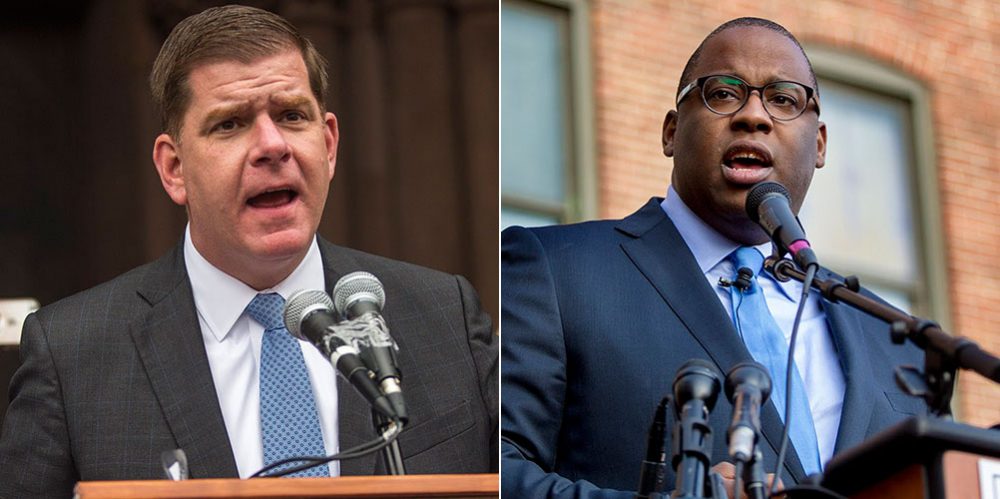Advertisement
Walsh And Jackson Face Off In Contentious First Mayoral Debate
Resume
Boston Mayor Marty Walsh and his rival, City Councilor Tito Jackson, sparred in their first mayoral debate on Wednesday night, with each claiming to be the best choice for the aspirations of the city's less affluent residents.
The two candidates debated before a capacity crowd at Hibernian Hall, just off Dudley Square in the heart of Roxbury.
Racial Inequality A Focal Point
Jackson said that as mayor he would ensure all of Boston's residents benefit from one of the most prosperous periods in the city's history. Walsh, meanwhile, defended his record of growth — and also acknowledged more could be done to include neighborhoods of color in that growth.
Throughout the debate, Jackson pointed to racial inequities in the city, but Walsh would not concede the mantle of defender of those who suffer from racial injustice.
Their most heated exchange — really the only point when the two candidates addressed each other directly — came when Jackson said he tried to get Walsh to pay attention to racial tensions at Boston Latin School. Walsh said he wished he had known sooner about problems at the city's most prestigious public school.
"I would have got involved, but my opponent got two emails from the headmaster and didn't respond," Walsh said over the yells of some audience members.
"Mayor Walsh, I handed you documentation that said that racist activity and racist tweets were going on at that school," Jackson retorted. "Your administration did nothing, and that actually showed that you actually didn't believe that black lives mattered at that point. It is absolutely critical that our young people are held safe and harmless when it comes to these issues. That was a management issue."
Members of the audience often interrupted, sometimes interjecting with their own questions. It happened when the moderator, Boston Globe columnist Adrian Walker, asked Walsh if Boston's reputation for being unwelcoming to people of color — if not downright racist — is still deserved.
"I have been very outspoken on this issue of race," Walsh said. "Over the last year-and-a-half, we've seen controversy around football players taking a knee, and some people are saying, 'you know, they shouldn't be taking a knee, they're disrespecting the country.' What we have to do is look at the issue of why they're taking a knee, because of police-involved shooting and police brutality around the country. And when you think about race and racism in the city of Boston, it does exist. It exists all over America."
Disputes Over Housing
Amid the boom in construction and an impressive number of new housing units being built in Boston, much of Wednesday night's debate was over how much should be more affordable to people who already live and work in the city.
Walsh pointed out that one-fifth of Boston housing is low-income housing — the highest percentage in the country for medium-sized cities.
Jackson said the construction of luxury high-rises, on the other hand, does little to provide housing.
"Because only 20 percent of the people in the Millennium Tower downtown actually take advantage of something that says that they live in the building, and so we know that the ownership that is occurring at the Millennium Tower — which is nearly 500 units — most of the people who have purchased it are investors," Jackson said. "Most of the people who have purchased it are foreign investors, and they are not actually providing access to people in the city of Boston."
Jackson accused Walsh of making promises, such as more housing, that he didn't keep.
Walsh defended his Boston as a city where hopes and dreams are being fulfilled, while acknowledging that not all neighborhoods have benefited equally.
Correction: Due to an editing error, an earlier version of this post misattributed to Walsh a contextual line connecting income inequality and low-income housing. The line has been removed, and we regret the error.
This article was originally published on October 12, 2017.
This segment aired on October 12, 2017.
